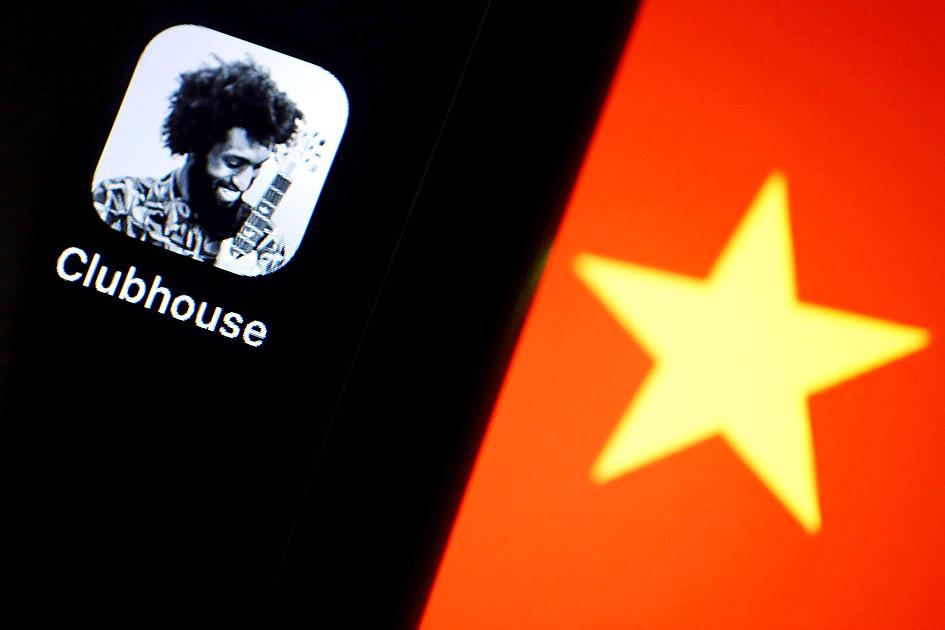Clubhouse, the popular app that allows people to create digital discussion groups, said that it is reviewing its data security practices after the Stanford Internet Observatory (SIO) found potential vulnerabilities in its infrastructure that could allow external access to users’ raw audio data.
The SIO confirmed that Agora Inc (聲網), a Shanghai-based start-up with offices in Silicon Valley, provides back-end infrastructure to Clubhouse and sells a “real-time voice and video engagement platform.”
User IDs are transmitted in plaintext over the Internet, making them “trivial to intercept,” it said.

Photo: Reuters
User IDs are like a serial number, not the username of the person. Agora would likely have access to users’ raw audio, potentially providing access to the Chinese government, it said.
“Any observer of Internet traffic could easily match IDs on shared chatrooms to see who is talking to whom,” the SIO said in its Twitter feed about its findings. “For mainland Chinese users, this is troubling.”
SIO, a program at Stanford University that studies disinformation on the Internet and social media platforms, said it observed metadata from a Clubhouse chatroom “being relayed to servers we believe to be hosted in” China.
Analysts also saw audio being relayed “to servers managed by Chinese entities and distributed around the world,” its report said.
As a Chinese firm, Agora is subject to China’s cybersecurity laws and would be “legally required to assist the government in locating and storing” audio messages authorities said jeopardized national security, SIO said.
Agora did not immediately respond to e-mails outside regular business hours seeking comment.
“Any unencrypted data that is transmitted via servers in the PRC [People’s Republic of China] would likely be accessible to the Chinese government,” it said.
Since SIO was able to observe the transmission of metadata between servers, it believes the Chinese government would be able to collect metadata without having to access Agora’s networks.
However, SIO said Agora claims not to store user audio or metadata “except to monitor network quality and bill its clients,” which means it would not have any records of user data if Beijing were to request it.
It also said that as long as audio was stored in the US, it was unlikely that the Chinese government would be able to access it.
SIO said it chose to disclose the security issues because they were easy to uncover and because of the risk they pose to Clubhouse’s millions of users.
“SIO has discovered other security flaws that we have privately disclosed to Clubhouse and will publicly disclose when they are fixed or after a set deadline,” it said.
In a statement included in the report, Clubhouse said it would roll out changes over 72 hours to add “additional encryption and blocks to prevent Clubhouse clients from ever transmitting pings to Chinese servers. We also plan to engage an external data security firm to review and validate these changes.”

The Ministry of the Interior (MOI) is to tighten rules for candidates running for public office, requiring them to declare that they do not hold a Chinese household registration or passport, and that they possess no other foreign citizenship. The requirement was set out in a draft amendment to the Enforcement Rules of the Public Officials Election and Recall Act (公職人員選舉罷免法 ) released by the ministry on Thursday. Under the proposal, candidates would need to make the declaration when submitting their registration forms, which would be published in the official election bulletin. The move follows the removal of several elected officials who were

The Republic of China (ROC) is celebrating its 114th Double Ten National Day today, featuring military parades and a variety of performances and speeches in front of the Presidential Office in Taipei. The Taiwan Taiko Association opened the celebrations with a 100-drummer performance, including young percussionists. As per tradition, an air force Mirage 2000 fighter jet flew over the Presidential Office as a part of the performance. The Honor Guards of the ROC and its marching band also heralded in a military parade. Students from Taichung's Shin Min High School then followed with a colorful performance using floral imagery to represent Taiwan's alternate name

FOUR DESIGNATED AREAS: Notices were issued for live-fire exercises in waters south and northwest of Penghu, northeast of Keelung and west of Kaohsiung, they said The military is planning three major annual exercises across the army, navy and air force this month, with the navy’s “Hai Chiang” (海強, “Sea Strong”) drills running from today through Thursday, the Ministry of National Defense said yesterday. The Hai Chiang exercise, which is to take place in waters surrounding Taiwan, would feature P-3C Orion maritime patrol aircraft and S-70C anti-submarine helicopters, the ministry said, adding that the drills aim to bolster the nation’s offshore defensive capabilities. China has intensified military and psychological pressure against Taiwan, repeatedly sending warplanes and vessels into areas near the nation’s air defense identification zone and across

A Chinese takeover of Taiwan would severely threaten the national security of the US, Japan, the Philippines and other nations, while global economic losses could reach US$10 trillion, National Security Council Deputy Secretary-General Lin Fei-fan (林飛帆) wrote in an article published yesterday in Foreign Affairs. “The future of Taiwan is not merely a regional concern; it is a test of whether the international order can withstand the pressure of authoritarian expansionism,” Lin wrote in the article titled “Taiwan’s Plan for Peace Through Strength — How Investments in Resilience Can Deter Beijing.” Chinese President Xi Jinping’s (習近平) intent to take Taiwan by force